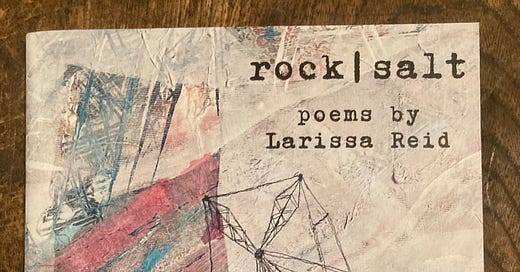First off the shelf was Larissa Reid’s new poetry collection, Rock/Salt. Part of a collaboration with visual artist Elspeth Knight, this is Reid’s third collection. I’ve been friends with her since university when we were in the same writing group, and while I’ve always admired her writing, this is definitely her best collection yet. Her greatest strengths as a poet have always been imagery and description, and it feels like working on a largely visual project has pushed that facet of her talent even further. This is also, if I’m not mistaken, the first time she’s published work in Scots as well as English. Perhaps 40-50% of the book is in Scots and again, it’s like her work has pushed out into new areas. I’ve always been drawn to cross-form collaborations and this is exactly why. I’m not qualified to talk in anyway about Knight’s paintings but I’d imagine the collaboration was equally beneficial for her. You can see the full project here.
More poetry! Edinburgh, Come All Ye is the collected poems from Alan Spence’s stint as Edinburgh Makar (poet laureate). Alan is best known (poetically) for haiku, and there are some crackers here, but for the first time (as far as I’m aware) he has written a number of longer, narrative poems and it’s delightful to see a voice with which I’m very familiar (Alan was writer in residence at Aberdeen University when I was there and I’ve been a fan and then a friend since that time) stretching into new areas. What’s more, at 75 years old, Alan is showing that you never stop developing as an artist. This is a great collection but the stand out poem for me is “Passing” which ends with the overheard, repeated refrain which has become my new mantra:
“Just play a while, and then we have to go”
While ordering Edinburgh, Come All Ye I spotted two more poetry books Alan had low key dropped recently. The first was Thirteen Ways of Looking at Tulips on Renaissance Press, a haiku collection that very much wears its heart on its cover. Great stuff.
Finally, there was Less, a single haiku, beautifully presented by Essence Press in a limited edition print. I love these kind of things, and showing a single haiku is something that so rarely happens. More of this sort of thing!
My on-going love affair with the prose of Porochista Khakpour encountered her debut novel, Sons and Other Flammable Objects, the story of a dysfunctional father/son relationship in an Iranian-American family. It’s not as good as The Last Illusion (see April) and yet again I curse myself for reading out of chronological order. Most writers improve with each book so reading backwards goes against the grain. That’s not to say this is bad—by no means—just that The Last Illusion is so good, this cannot help but look like a step on the way to that peak. Again I say, if you haven’t read Porochista Khakpour, get her books on your list.
I’m a big fan of Shusaku Endo. Silence is rightly his most famous novel but Deep River is also a solid classic, so I was excited to find Volcano in a secondhand shop in Tokyo. The story of two old men meeting their unhappy ends and looking back on their lives with bitterness and regret is not his best, it has to be said, but there are some poignant moments that show the insight into the unbearable lightness of being Endo had.
Eri Hotta’s masterly study of the internal politics of the Japanese government and the series of depressing failures that led to the attack on Pearl Harbor is well worth checking out if this period in history is your thing. It’s impossible to avoid the conclusion that the biggest failing was a political elite more concerned with saving face and avoiding humiliation than doing the right thing, which is terrifying to consider while casting an eye around the globe at the shower currently in charge. Maybe we never had leaders of real moral worth but they are certainly lacking today, just as they were in 1941.
Finally, Maureen Myant’s crime novel The Confession is an intriguing twist on the genre I’ve never seen before. It opens with a woman confessing to five murders, only one of which actually seems to have taken place and for which a man is already serving time. Cue a police force in a flap trying to work out what the hell is going on. Gripping, thrilling, original - everything you want in crime fiction, really. I’ve been a fan of Myant’s writing for years, since I worked as editor on a sadly as-yet unpublished novel, so it was great to see new work by her, hopefully the first of many more to come.












Thanks for the review, Iain. Glad you enjoyed The Confession! Trying to write its sequel at the moment. Hope your own writing is going well. It was great to see The Waves Burn Bright being republished. All best, Maureen